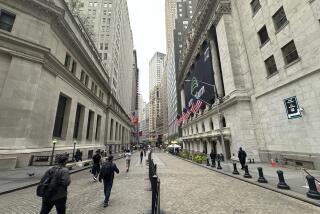Stocks drop as Cyprus bailout plan renews Eurozone fears
- Share via
NEW YORK -- Stocks fell in early trading as Cyprus’ banking woes sent shivers throughout the financial markets, raising fears the Eurozone debt crisis would reignite.
The Dow Jones industrial average was down 51.30 points, or 0.35%, to 14,462.81 shortly after the opening bell. The Dow had initially dropped more than 100 points in early trading, but the blue-chip index pared its losses.
The broader Standard & Poor’s 500 index was down 10.76 points, or 0.69%, or 1,549.94. The S&P; had been flirting with a new all-time high for the first time in a half decade, riding a stock-market rally that accelerated this year. The technology-heavy Nasdaq was off 22.25 points, or 0.68%, to 3,226.82.
U.S. markets followed European and Asian stock markets, which were down about 1% to 2% or more Monday.
European leaders’ decision to force bank depositors to pay for Cyprus’ bailout sparked fears of a bank run that could spread to other financially weakened countries in the currency bloc, like Spain and Italy.
Lawmakers in Cyprus had been scheduled to vote Monday on whether to approve the nearly 10% levy on savers, but reportedly delayed taking any action until Tuesday.
Stocks have reached record highs this year as the Federal Reserve and other central banks across the world have pumped enormous amounts of money into the world economy.
The easy-money policies have pushed down interest rates to historic lows and forced investors looking for any meaningful returns to plow into riskier assets like stocks.
Since the start of the year, fears over Washington political dysfunction have faded, and so had worries over the European debt crisis -- and the potential for contagion to the world’s banks.
ALSO:
Hotels feel the pain of federal budget cuts
Airlines push for system to sell more than just a seat
Hotel housekeepers get tips more than concierges, survey says
More to Read
Inside the business of entertainment
The Wide Shot brings you news, analysis and insights on everything from streaming wars to production — and what it all means for the future.
You may occasionally receive promotional content from the Los Angeles Times.










